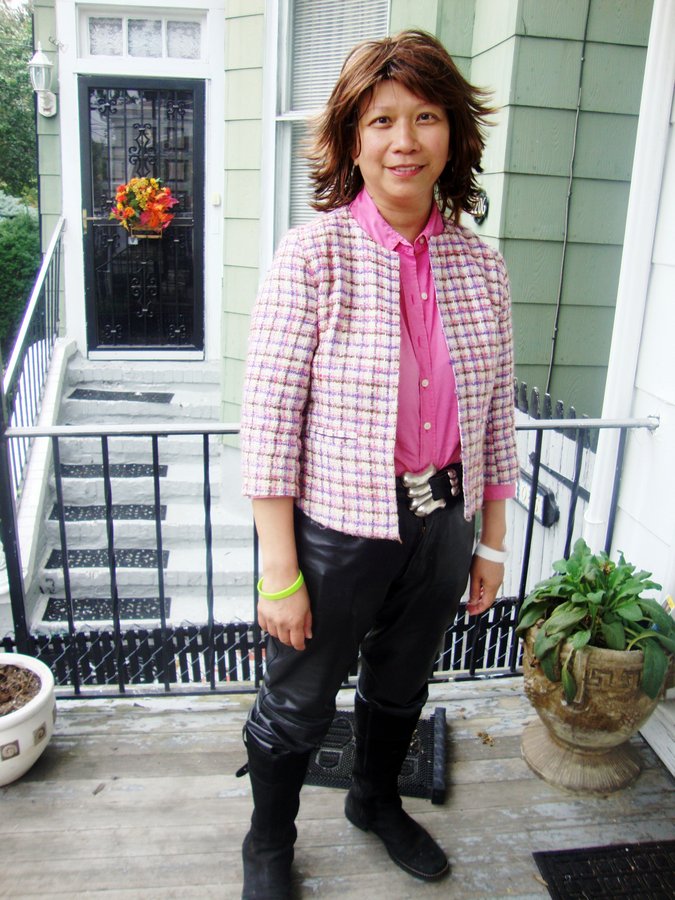Local art and community advocate Toni Fukuda stands in her Weehawken home dressed in a bright pink shirt and black leather pants – and she is bald.
She points to a wig lying on a countertop next to the makeshift bed in the middle of her living room where she slept when she was unable to walk not long ago.
“This is my hair,” she says. “It’s red. My sister thinks it’s silly since I have black hair, but I think it suits me.”
When Fukuda was diagnosed with spinal, lymph, and breast cancer in April of 2011, she couldn’t imagine she’d be celebrating her continuing recovery along with nearly 2,400 other patients, their friends, family, and doctors at the Life and Liberty Event in Liberty State Park sponsored by Hackensack’s John Theurer Cancer Center on Sept. 18.
“I always look for the light at the end of the tunnel.” – Toni Fukuda
____________
Fifteen years ago, Fukuda began a career as an art curator, inspired by Native American pieces she had seen while traveling with her husband. With the belief that this and other lesser-known art cultures were grossly underrepresented in the American urban gallery circuit, she founded a gallery in SoHo to feature the artists she had discovered.
This led to tours and more galleries until she decided to shift gears and take up the art of parenting. Once her three children (now 10, 12 and 14) reached more independent ages, she re-started her curatorial career locally.
Curating, and cancer
It began at St. John’s Episcopal Church in Union City, where she had a local artist drive a Harley Davidson right down the aisles of the church as part of their first exhibit. It was such a hit that it turned into Union City’s renowned “Celebrate Art” project, which went on to include film festivals, theatre and cabaret productions.
“I get bored easily,” Fukuda said, shifting in her armchair with a mischievous grin. She went on to start the Family Alliance Network (FAN), a community outreach program serving members of Hudson County.
Last April, she noticed a small lump in her left breast, but because of her busy lifestyle she paid it little attention, until it grew “to the size of about half a softball that was protruding through my skin” and began to impede her breathing.
Her sister took her to a local hospital that confirmed her greatest fear: she had breast cancer. The tumor was so large it had to be shrunk before it could be removed. She was referred to the John Theurer Cancer Center, one of the top 50 cancer hospitals, according to U.S. News and World Report.
By the time Fukuda went in for a battery of tests, she had begun to suspect her illness went beyond breast cancer.
“I couldn’t walk,” she said. “I had no energy. It had to be something more.”
Top resident oncologist Dr. Stanley Waintraub confirmed her suspicion. The cancer had rapidly metastasized into her spine and lymph nodes, and because it had weakened her entire system so severely, she was immediately sent in for 30 consecutive days of spinal laser radiation, a process that would hopefully stabilize her enough so that her breast cancer could be properly addressed.
Needless to say, such aggressive treatment left Fukuda utterly spent.
“You become completely dependent on other people for everything, which was not anything I was used to,” she said.
She could not have survived the ordeal without the loving support of family and friends, she says, nor without the staff at John Theurer.
“It’s like checking into a hotel,” Fukuda said. “I totally, totally, totally recommend [the center] to anyone. They were so attentive and supportive, from the doctors to the people who change your bedpan. They treat you like you’re family, which is so important for healing.”
Once Fukuda’s condition stabilized enough for chemotherapy, Dr. Waintraub was finally able to treat her breast cancer. He used a groundbreaking combination of Avastin (a tumor-starving therapy) in combination with Taxol (a more standard form of chemotherapy) and in a mere three one-week sessions, the tumor in her breast had reduced so dramatically that the nurses performing the follow-up MRI asked her if she’d already had surgery to remove it.
Art as therapy
Patients say the Cancer Center is successful because it considers the whole person, not just the illness. They have an art therapy program in the works, according to Jersey City resident artist Stephanie Riggi, who began treatment for breast cancer at the center in 2009.
During her eight rounds of chemo and 33 rounds of radiation, Riggi created a body of work entitled “The Effects of Chemo” as motivation to go on.
“Art really pulled me through,” Riggi recalled, as did the hospital staff. “They were the best team and the best nurses I could have hoped for.”
Her last radiation treatment was in May of 2010, and since then, she has re-joined the Jersey City Artists’ Studio Tour and has several upcoming shows in Manhattan.
Riggi has been asked to collaborate with the center to provide patients with art and music classes. She is excited to “give back” some of what she received during her own heroic healing process. One of her pieces, “The Tree of Good Vibes,” already brightens the center’s corridors.
Meanwhile, Toni Fukuda still awaits surgery. The prognosis, and her attitude, are against-the-odds positive. Members of FAN, the group she once helped to found, take her for walks and drive her to her remaining chemo treatments to take the burden off her family. She is a staunch supporter of Falun Dafa, an alternative, spiritual approach to healing.
“Every day I push myself,” she said. “I always look for the light at the end of the tunnel. I have three kids to live for! I don’t care what I have to do. I’m going to fight it. I’m going to figure it out.”
Gennarose Pope may be reached at editorial@hudsonreporter.com.
